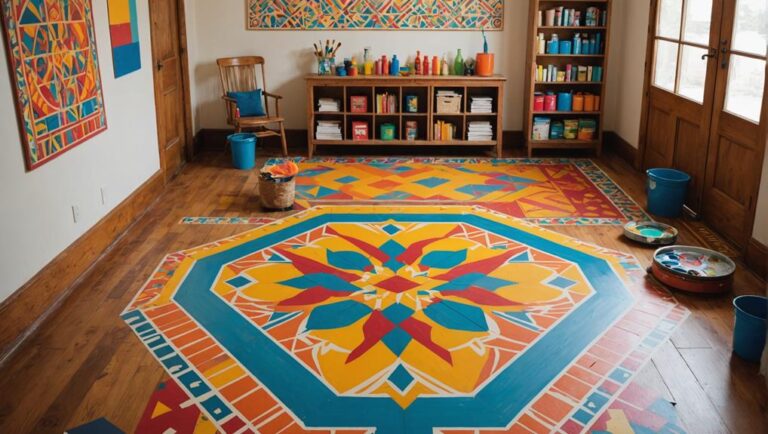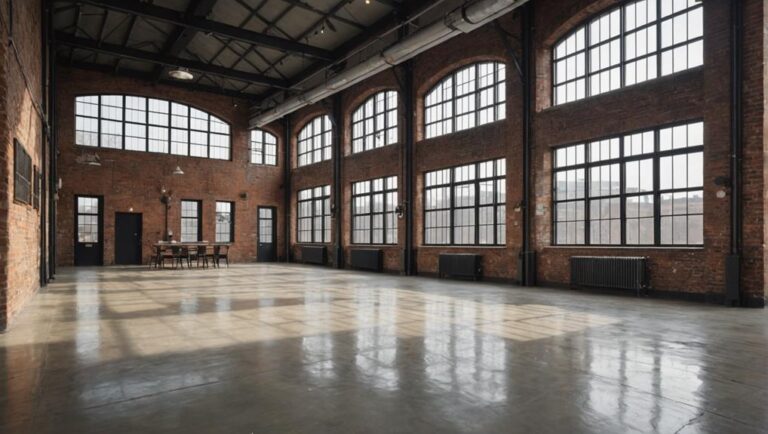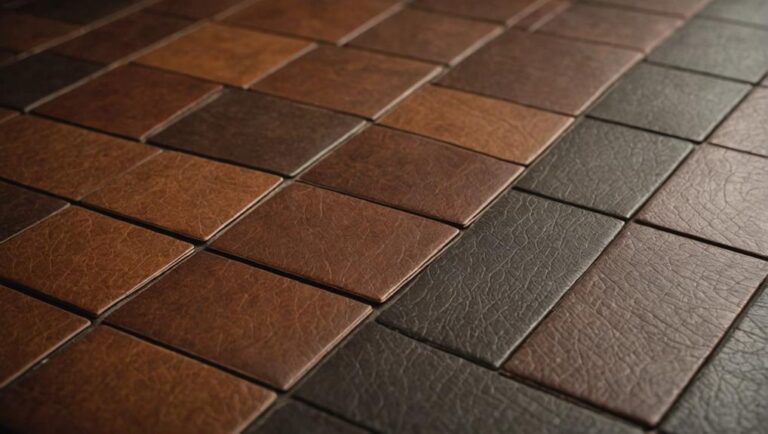When searching for the best flooring options for your basement, consider durability and moisture resistance. Vinyl plank flooring is a fantastic choice, as it's affordable, easy to maintain, and mimics the look of wood. Laminate is another budget-friendly option that stands up to high traffic. If you want warmth, carpet tiles provide comfort while absorbing noise. For a more natural feel, cork flooring offers insulation and a variety of styles. Tile is not only durable but also boosts your home's value. With so many options available, you'll find the perfect fit for your basement's unique ambiance. Explore what suits you best!
Vinyl Plank Flooring
When you step into your basement, the last thing you want is cold, damp flooring beneath your feet. That's where vinyl plank flooring comes into play. This option is designed to withstand moisture, making it a top contender for your basement renovation. With robust water resistance features, vinyl planks can handle spills and humidity without warping or developing mold, ensuring a safer environment for you and your family.
One of the most appealing aspects of vinyl plank flooring is its versatility in design. You can find options that mimic the look of hardwood or stone, allowing you to achieve a stylish basement aesthetic without sacrificing practicality. Plus, installation is often straightforward, meaning you can enjoy your new flooring sooner rather than later.
When considering your budget, it's vital to conduct a cost comparison. Vinyl plank flooring is generally more affordable than other water-resistant options like tile or engineered wood. This makes it an excellent choice if you're looking to upgrade your basement without breaking the bank.
Moreover, the durability of vinyl means you won't need to worry about frequent replacements, saving you money in the long run. Investing in quality vinyl planks pays off, providing a long-lasting, low-maintenance solution for your basement that keeps safety and comfort at the forefront. With the right vinyl flooring, you can transform your basement into a cozy, inviting space that feels just as good as the rest of your home.
Laminate Flooring
If you're looking for an attractive and budget-friendly flooring option for your basement, laminate flooring might be just what you need. This flooring type not only adds a stylish touch but also offers fantastic cost effectiveness, making it a popular choice among homeowners. Plus, laminate is designed with moisture resistance in mind, which is essential in a basement environment where humidity can be an issue.
Here are some key benefits of choosing laminate flooring for your basement:
- Easy Installation: Many laminate options come with click-lock technology, allowing for a hassle-free DIY installation.
- Durability: Laminate can withstand the wear and tear of daily activities, making it perfect for high-traffic areas.
- Variety of Designs: With a plethora of colors and textures, you can find laminate that mimics hardwood, stone, or tile.
- Low Maintenance: A simple sweep and occasional mopping are usually all it takes to keep your laminate looking great.
- Affordability: Compared to other flooring options, laminate often comes at a fraction of the cost, making it a smart investment.
When you choose laminate flooring, you're not just getting a beautiful surface; you're also making a practical decision for your basement. With its moisture-resistant properties and cost-effective nature, laminate flooring can transform your space while keeping safety a top priority. So, consider laminate for your next basement upgrade!
Carpet Tiles
What could be more inviting than stepping onto a cozy surface that adds warmth and comfort to your basement? Carpet tiles offer the perfect blend of style and functionality, making them an excellent choice for your subterranean sanctuary. With design versatility, you can mix and match colors and patterns to create a unique look that reflects your personality while still boosting safety.
One of the standout features of carpet tiles is their acoustic benefits. If you're looking to reduce noise, whether it's from foot traffic or a home theater setup, these tiles can absorb sound effectively, creating a quieter, more enjoyable environment. Plus, they're softer underfoot, which means you'll feel comfortable spending hours in your cozy retreat.
When it comes to maintenance, carpet tiles are a practical option. If a tile gets stained or damaged, you can simply replace it without having to redo the entire floor. This not only saves you time but also guarantees your basement remains looking fresh and inviting.
Safety is paramount, especially in a basement where moisture might be a concern. Many carpet tiles are designed to be moisture-resistant, minimizing the risk of mold and mildew. Additionally, the textured surface can provide extra traction, reducing the likelihood of slips and falls.
Incorporating carpet tiles into your basement design not only enhances its aesthetic appeal but also creates a warm, inviting atmosphere that you and your guests will love.
Concrete Flooring
Concrete flooring can transform your basement into a sleek and modern space that's both functional and stylish. It offers an array of benefits that make it an excellent choice for this often overlooked area of your home. Not only is concrete flooring durable, but it also provides excellent moisture control, essential for maintaining a safe environment in basements prone to dampness.
If you're considering concrete flooring, here are some advantages to keep in mind:
- Versatility: You can choose from various finishes, including polished or textured options, to match your style.
- Concrete Staining: Add a splash of color and personality with concrete staining, allowing you to create a unique look.
- Low Maintenance: Unlike other flooring types, concrete is easy to clean and doesn't require extensive upkeep.
- Safety: With proper sealing, concrete flooring can minimize slip hazards, especially when treated with anti-slip coatings.
- Cost-Effective: It's often more affordable than hardwood or tile, making it budget-friendly for any renovation.
When installing, guarantee proper moisture control measures are in place to prevent water damage. This includes applying sealants and ensuring proper drainage. With the right approach, concrete flooring can serve as a stunning foundation for your basement, combining style and practicality. So, whether you're setting up a gym, a cozy lounge, or a play area, consider concrete flooring for a safe and attractive solution.
Cork Flooring
Cork flooring is an increasingly popular choice for basements, offering a unique blend of comfort and practicality that few other materials can match. If you're looking for a flooring option that not only feels good underfoot but also provides safety and durability, cork might just be your perfect fit. One of the key cork benefits is its natural thermal insulation, which helps keep your basement warm during the colder months, making it a cozy haven.
Another major advantage is cork's sound-absorbing qualities. With its natural cell structure, cork minimizes noise, allowing you to enjoy peace and quiet even in bustling households. Plus, cork is naturally resistant to mold and mildew, providing a safer environment, especially in moisture-prone areas like basements.
When it comes to cork installation, you'll find it straightforward, especially with the click-lock options available today. You won't need to worry about messy adhesives, as many cork tiles and planks can be installed as a floating floor. Just verify that your basement is properly prepared, with a moisture barrier in place if necessary.
Cork flooring also offers a variety of styles and colors, allowing you to personalize your space while enjoying all these practical benefits. So, if you're considering an upgrade, cork flooring could bring both comfort and safety to your basement, making it a fantastic choice for your home.
Tile Flooring
When it comes to flooring options for your basement, tile flooring stands out as a versatile and stylish choice that can elevate the entire space. Not only does tile provide a polished aesthetic with its glossy finish, but it also offers practical benefits that make it a smart option for below-grade installations.
Tile flooring is known for its durability and resistance to moisture, which is essential in a basement environment. You won't have to worry about water damage or mold growth, making it a safe choice for your home. Plus, with its ability to retain heat, tile can provide some level of thermal insulation, ensuring your basement stays cozy during colder months.
Here are some reasons to evaluate tile flooring for your basement:
- Easy maintenance: Just a simple sweep and mop keep it looking great.
- Variety of styles: From classic to modern, there's a style for every taste.
- Allergy-friendly: Tiles don't trap dust or allergens, promoting better air quality.
- Resale value: High-quality tile can enhance your home's value.
- Slip-resistant options: Look for textured tiles to enhance safety underfoot.
Engineered Hardwood
If you're looking to bring warmth and elegance to your basement, engineered hardwood might just be your best bet. Its durability and stability make it a practical choice in a space prone to moisture and temperature fluctuations. Plus, with straightforward installation and minimal maintenance, you can enjoy the beauty of hardwood without the hassle.
Durability and Stability
Over the years, engineered hardwood has emerged as a top contender for basement flooring, thanks to its impressive durability and stability. Unlike traditional hardwood, engineered hardwood is designed to withstand the unique challenges of basement environments. It boasts enhanced moisture resistance, making it less susceptible to warping or buckling, which is essential for your peace of mind.
Here are some key benefits that highlight its durability and stability:
- Multi-layer construction: This design helps it resist temperature fluctuations and humidity changes.
- Surface finish: The protective layer offers excellent scratch resistance, keeping your floors looking pristine.
- Easy repairs: If a plank gets damaged, you can replace it without redoing the entire floor.
- Natural aesthetics: You get the beauty of wood without sacrificing performance.
- Long lifespan: With proper care, engineered hardwood can last for decades, making it a wise investment.
Installation and Maintenance
With its impressive durability and stability, engineered hardwood not only enhances your basement's aesthetic but is also relatively straightforward to install and maintain. To guarantee a successful installation, start with proper subfloor preparation. Make sure your subfloor is clean, dry, and level; this will help prevent any future issues related to moisture control. If your basement is prone to dampness, consider using a moisture barrier to protect your flooring.
Once the subfloor's ready, installation can be done as a floating floor or glued down, depending on your preference. Floating installations are particularly user-friendly and require minimal tools, making them ideal for DIY enthusiasts.
When it comes to maintenance, engineered hardwood is a breeze. Regular sweeping or vacuuming will keep dirt and debris at bay, while occasional damp mopping with a gentle cleaner will maintain its beauty. Avoid harsh chemicals, as they can damage the finish.
Lastly, keeping an eye on humidity levels in your basement will prolong your flooring's lifespan. With just a little effort in installation and maintenance, you can enjoy the warm, inviting feel of engineered hardwood for years to come.
Rubber Flooring
Rubber flooring is a fantastic choice for basements, combining durability and comfort in one versatile package. If you're looking for a flooring option that excels in safety and longevity, rubber flooring is worth considering. Not only does it offer excellent moisture resistance, but it also provides a cushioned surface that can be incredibly beneficial in a high-traffic area like a basement.
Here are some compelling reasons to choose rubber flooring for your basement:
- Cost Effectiveness: Rubber flooring can be more affordable in the long run due to its durability and low maintenance needs.
- Moisture Resistance: Perfect for basements, rubber doesn't absorb water, helping prevent mold and mildew.
- Safety First: The non-slip surface reduces the risk of falls, making it a smart choice for families with kids or elderly members.
- Comfort Underfoot: Its cushioning effect makes standing for long periods more comfortable, ideal for workout spaces or play areas.
- Variety of Styles: Available in many colors and patterns, you can easily find a design that complements your basement decor.
With its combination of cost effectiveness and superior moisture resistance, rubber flooring is not just a practical choice but also a stylish one. You'll appreciate the peace of mind that comes from knowing your basement is safe, comfortable, and resilient, providing a welcoming environment for family and friends. Consider rubber flooring for your basement, and enjoy a practical solution that meets all your needs!
Frequently Asked Questions
How Do I Prevent Mold Under Basement Flooring?
To prevent mold under your basement flooring, start by ensuring proper ventilation. You'll want to install a moisture barrier before laying down any flooring. This barrier stops moisture from seeping in and creates a dry environment. Consider using dehumidifiers to maintain low humidity levels. Regularly check for leaks or water intrusion, and if you notice any signs of mold, address them immediately. With these steps, you can safeguard your space against mold growth.
Can I Install Flooring Over Existing Basement Materials?
Yes, you can install flooring over existing basement materials, but it's crucial to verify the underlying surface is clean and dry. Depending on the flooring materials you choose, different installation methods may apply. For example, using a floating floor can work well over concrete, while glue-down options might require a smooth base. Just make sure to address any moisture concerns first to keep your space safe and mold-free. Proper prep leads to a lasting finish!
What Is the Average Cost of Basement Flooring Options?
You might think basement flooring is too expensive, but it's all about the cost comparison. On average, you're looking at $2 to $10 per square foot, depending on the material. Vinyl and laminate offer great affordability and flooring durability, while tiles can be pricier but provide a robust option. Investing wisely guarantees safety and comfort, so consider long-term benefits over initial costs. Your basement can be stylish without breaking the bank!
How Do I Maintain Flooring in a High Humidity Basement?
To maintain flooring in a high humidity basement, you'll want to focus on effective humidity control. Start by using dehumidifiers to keep moisture levels in check. Installing moisture barriers beneath your flooring can also help prevent dampness from seeping through. Regularly check for leaks and guarantee proper ventilation. Finally, clean up spills promptly and consider using rugs that dry quickly, keeping your space safe and comfortable for everyone.
Are Any Flooring Options Better for Soundproofing?
When you're pondering soundproofing options, you might stumble upon acoustic panels and soundproof mats as two great choices. It's funny how the right flooring can turn chaos into calm! Acoustic panels absorb sound waves, while soundproof mats can minimize impact noise. If safety's a concern, look for non-toxic materials. By combining these elements, you'll create a serene space, ensuring comfort and tranquility, no matter how lively the activity above you gets!




